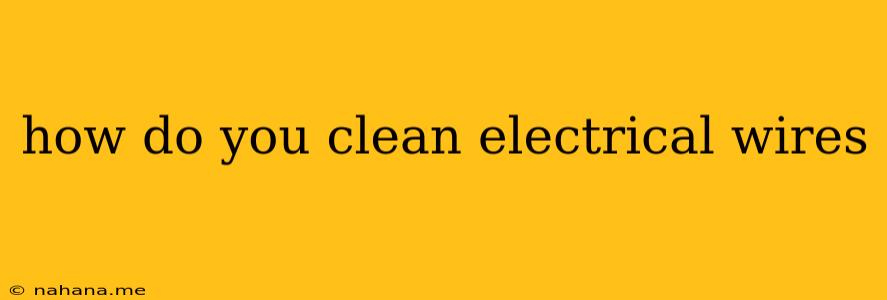How to Clean Electrical Wires: A Guide for Safety and Efficiency
Cleaning electrical wires might seem like a daunting task, but it's essential for maintaining the safety and efficiency of your electrical system. Dirty wires can lead to overheating, resistance, and even fire hazards. This guide will walk you through the process of cleaning electrical wires safely and effectively.
Why Clean Electrical Wires?
- Improved Conductivity: Dirt and grime can build up on the surface of wires, creating resistance and hindering the flow of electricity. Cleaning them removes this resistance, improving conductivity and reducing energy loss.
- Reduced Fire Risk: Overheating caused by resistance can melt insulation and lead to electrical fires. Cleaning wires helps prevent this by ensuring smooth current flow.
- Longer Lifespan: Keeping wires clean extends their lifespan by preventing corrosion and damage.
Safety Precautions
Before you begin, always prioritize safety:
- Disconnect the power: Never work on live electrical wires. Disconnect the power source at the breaker box before you start cleaning.
- Use appropriate tools: Use insulated tools to prevent electrical shock.
- Wear protective gear: Wear safety glasses and gloves for protection from debris and potential shocks.
- Work in a well-ventilated area: Electrical work can generate dust and fumes.
Cleaning Methods
Here are some cleaning methods for different types of electrical wires:
1. Cleaning Bare Wires:
- Use a wire brush: A stiff wire brush can effectively remove dirt and corrosion from bare copper or aluminum wires.
- Sandpaper: Fine-grit sandpaper can be used to remove stubborn debris.
- Solvent: For heavy corrosion, a specialized electrical contact cleaner can be used.
2. Cleaning Insulated Wires:
- Use a damp cloth: For lightly soiled wires, gently wipe them down with a damp cloth.
- Vacuum cleaner: A brush attachment on a vacuum cleaner can remove dust and debris from wire insulation.
- Air compressor: An air compressor can be used to blow away dust and debris.
Additional Tips
- Inspect for damage: While cleaning, carefully inspect the wires for any signs of damage, such as cracks, cuts, or exposed conductors. If you find damage, replace the wire immediately.
- Apply dielectric grease: After cleaning, applying a thin layer of dielectric grease to the wire terminals can help prevent corrosion and improve conductivity.
- Store wires properly: Keep cleaned wires in a dry and dust-free environment to prevent them from becoming soiled again.
When to Seek Professional Help
For complex wiring systems, or if you're unsure about the cleaning process, it's best to consult a qualified electrician. They have the expertise and tools to ensure your electrical system is cleaned safely and effectively.
